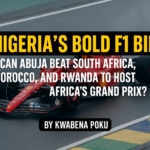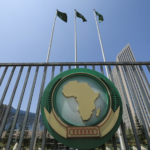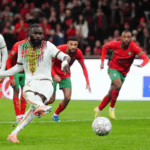
For the first time in 32 years, Africa could once again hear the roar of Formula 1 engines — and Nigeria has just joined the race to make it happen.
Earlier this week, Nigeria’s National Sports Commission officially announced its intention to host a Formula 1 Grand Prix in Abuja. To lead the effort, the government has appointed Opus Race Promotions, co-led by former Premier League footballer Marvin Sordell, as its official promoter.
The plan isn’t just for a race; it includes a multi-million-dollar motorsport hub with a karting academy, hotels, and a technology park. This announcement positions Nigeria against South Africa, Morocco, and Rwanda, all of which are already pushing hard to bring F1 back to Africa.
The Contenders
South Africa remains the technical frontrunner, with the legendary Kyalami Circuit ready for FIA Grade 1 upgrades. Yet, political wrangling and promoter fee disputes have stalled progress.
Morocco is bringing money to the table — a staggering $1.2 billion Tangier motorsport city project with $800 million reportedly secured. The challenge? They still need a formal agreement with Formula One Management (FOM).
Rwanda has the strongest top-level support. President Paul Kagame announced the bid himself. However, geopolitics and a lack of public circuit plans could slow Kigali’s momentum.
Now enters Nigeria, Africa’s largest economy with a bold vision but no track, no FIA approvals, and no government guarantees publicly confirmed yet. It’s a powerful headline, but the project remains in its early pitch phase.
The F1 Landscape
Formula 1 is already operating at its 24-race limit, meaning any new venue must replace or rotate with an existing race. While the Dutch Grand Prix ends after 2026, and Belgium might shift to a biennial slot, competition for space remains fierce. F1 CEO Stefano Domenicali hasrepeatedly emphasized that an African race is still “a long way off,” highlighting the challenges beyond ambition.
Nigeria’s Chances
On a readiness scale, Nigeria currently lags behind South Africa and Morocco, scoring just 15/35 on key metrics like circuit status, promoter contracts, and funding. It has political will and an international-facing promoter, but turning that into concrete results — homologated tracks, contracts, and funding — will be a steep climb.
Why Africa Needs F1
Regardless of which country wins, the return of F1 to Africa is overdue. The last Grand Prix on the continent was at Kyalami in 1993. Africa has a vibrant motorsport culture, a booming youth audience, and a growing economic footprint that F1 can no longer ignore. Countries like Ghana, through initiatives like STEM Racing Ghana, can leverage this momentum by building fan zones, esports programs, and motorsport education hubs that support any future African Grand Prix.
It’s not just about where the race takes place — it’s about how the continent shares in the excitement and opportunities F1 brings.
The Road Ahead
Nigeria’s bid is bold and newsworthy. But will Nigeria see Lewis Hamilton or Max Verstappen on its streets by the end of the decade? That depends on how fast the country can move from headlines to hard contracts, concrete, and cash. Africa will get its Grand Prix back. The question is whether Nigeria will cross the finish line first.
- President Commissions 36.5 Million Dollars Hospital In The Tain District
- You Will Not Go Free For Killing An Hard Working MP – Akufo-Addo To MP’s Killer
- I Will Lead You To Victory – Ato Forson Assures NDC Supporters
Visit Our Social Media for More




